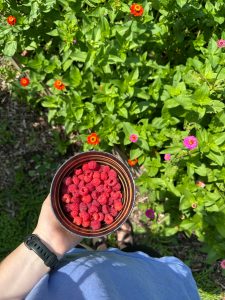 This summer, I am deeply grateful for all the growth and beauty I’ve been able to experience in the natural world. Cowles Bog, a trail in the Indiana Dunes National Park, was lovely the first time I hiked it in January, but now it gives a magical feeling filled in by green plants and dotted with yellow and purple flowers. I’m glad this summer that I am able to appreciate the beauty in moments of slowness. The garden I am helping with provides a different landscape of learning compared to hiking in the park with campers. But all of this growth, around me and in me, is a gift.
This summer, I am deeply grateful for all the growth and beauty I’ve been able to experience in the natural world. Cowles Bog, a trail in the Indiana Dunes National Park, was lovely the first time I hiked it in January, but now it gives a magical feeling filled in by green plants and dotted with yellow and purple flowers. I’m glad this summer that I am able to appreciate the beauty in moments of slowness. The garden I am helping with provides a different landscape of learning compared to hiking in the park with campers. But all of this growth, around me and in me, is a gift.My gratitude increases as I read Robin Wall Kimmerer’s book Braiding Sweetgrass because her thoughts lead me to find awe in the intricacies of the natural world. In this book, Kimmerer weaves Indigenous wisdom with scientific knowledge through her gift of storytelling, and proposes an alternate way to be in relationship with the earth. Her chapter “The Gift of Strawberries” has especially attuned me to notice the gifts and abundance around me. Through the poetic nature of her writing, Kimmerer draws on wild strawberries to describe the workings of a gift economy. She highlights how a gift creates an ongoing relationship between the giver and the receiver, and further, she articulates how the more something is shared, the greater its value becomes. In our economy of commodities, relationships are transactional, and positioned toward taking what one deserves. In a gift economy, action is based in the recognition of enoughness, and in abundance.
Looking at our world, I find it easy to see where economies of commodities rule relationships between people, objects, and our natural world. Instead of recognizing where there is abundance, I see systems of scarcity that grab hold of people and how they live. I see this economy of commodities run through what belongs to us, or what we think we deserve. I see it in the threats, cuts, and fears that tear apart relationships and build distrust. It is important to notice these spaces, to grieve where grief is necessary, to take action where action is needed. But also, I’m learning that recognizing the gifts and abundance is necessary to challenge this mindset of scarcity and fear. Kimmerer described a process of giving, receiving, reciprocating, that is essential to cultivating relationships and finding the enoughness through gifts.
This summer, I’m reminded of the gifts around me each and every day. These gifts are present in the striking color of wild flowers wading among the green lining a trail. The fragrance of flowers are a gift, along with the bee I hear buzz past me to continue pollinating. I hold the gifts in the abundance of harvest—zuchinni, cucumber, tomatoes, snap peas, green beans, and fresh raspberries—nestled in my arms and my hands. The gifts are also in environmental education, the teaching and practicing preservation. I hear these gifts in patient interactions with campers, where intentional affirmations build others up. I feel these gifts through the lovely people I am so grateful to know in the northwest corner of Indiana this summer.
As I think through calling and purpose, I have often circled back to themes of stewardship this summer. The more I notice the giving, receiving, and reciprocating in a gift economy, the more I see the call to steward these gifts. If gifts are a form of building relationships, there is a responsibility we are called to through stewardship. When stewardship is out of mind, gifts become fought for resources that promote mindsets of scarcity. But when we steward what we have been given, there is a deeper understanding of enoughness in the abundance for everyone to participate in the gift.
I’m grateful for my fellow staff members, housemates, friends, and this corner of Indiana as a whole for all the gifts that have been given so abundantly to me, and to each of us. May we be stewards of all this, the gifts we have been given.
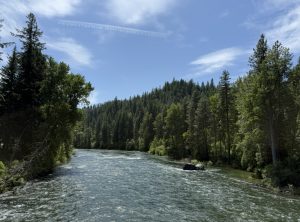 Recently, I had the opportunity to go floating on the Wenatchee river with some other staff from the Guild. While I’d floated before, I underestimated how different this river would b —louder, faster, and full of rocks. I wondered why we brought paddles for what I assumed would be a lazy float—until I found myself clinging to the raft as the current tossed us around. Three hours later, I got home exhausted but happy to have a great memory.
Recently, I had the opportunity to go floating on the Wenatchee river with some other staff from the Guild. While I’d floated before, I underestimated how different this river would b —louder, faster, and full of rocks. I wondered why we brought paddles for what I assumed would be a lazy float—until I found myself clinging to the raft as the current tossed us around. Three hours later, I got home exhausted but happy to have a great memory.  Recently, I had the opportunity to go floating on the Wenatchee river with some other staff from the Guild. While I’d floated before, I underestimated how different this river would b —louder, faster, and full of rocks. I wondered why we brought paddles for what I assumed would be a lazy float—until I found myself clinging to the raft as the current tossed us around. Three hours later, I got home exhausted but happy to have a great memory.
Recently, I had the opportunity to go floating on the Wenatchee river with some other staff from the Guild. While I’d floated before, I underestimated how different this river would b —louder, faster, and full of rocks. I wondered why we brought paddles for what I assumed would be a lazy float—until I found myself clinging to the raft as the current tossed us around. Three hours later, I got home exhausted but happy to have a great memory.  This summer, I am deeply grateful for all the growth and beauty I’ve been able to experience in
This summer, I am deeply grateful for all the growth and beauty I’ve been able to experience in 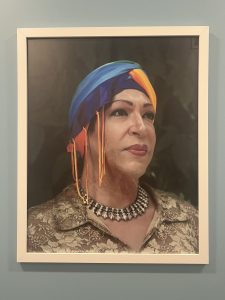 I’ve been working at Heartland Human Care Services’ Refugee and Immigrant Community Services (RICS) team for a little over a week, but it feels like I’ve gained at least two months of experience. I already have a well-established commute, taking the red line north through Old Town, Lincoln Park, and finally arriving at Uptown. I admire the artwork decorating the walls and street throughout the neighborhood as I walk the three blocks from the train station to Heartland. So far, I’ve had a habit of showing up early—when you’re taking the “L,” arriving just on time is a gamble against train delays and track repairs.
I’ve been working at Heartland Human Care Services’ Refugee and Immigrant Community Services (RICS) team for a little over a week, but it feels like I’ve gained at least two months of experience. I already have a well-established commute, taking the red line north through Old Town, Lincoln Park, and finally arriving at Uptown. I admire the artwork decorating the walls and street throughout the neighborhood as I walk the three blocks from the train station to Heartland. So far, I’ve had a habit of showing up early—when you’re taking the “L,” arriving just on time is a gamble against train delays and track repairs.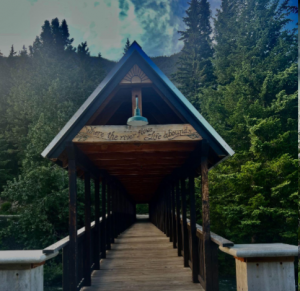 In my humble opinion the concept of Sacred Space is not just exclusive to Holden
In my humble opinion the concept of Sacred Space is not just exclusive to Holden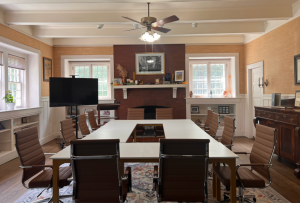 I spend most of my days working inside the Historic Barker House sitting at my desk with my
I spend most of my days working inside the Historic Barker House sitting at my desk with my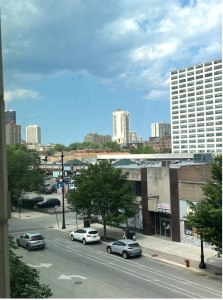 It’s been a month since I started at Heartland Alliance, and I’m so thankful for the experiences I’ve had and everything I’ve learned so far! Since completing my training, I have started working with some participants within the Refugee and Immigrant Community Services program. Some of my responsibilities when working with participants include reaching out to each participant and talking to them about their current employment situations, searching for jobs that participants are eligible for/interested in, and helping participants apply for jobs. If a participant gets a call-back for an interview with a job placement, it is also my responsibility to accompany them to the interview, if necessary. Each time that I interact with a participant, whether that’s over the phone or through messaging or in-person, I also have to file case notes. As I’ve started getting to know each situation and learning about how I can best serve the participants that I’ve been assigned, the case notes have been very helpful. I can go back and read case notes from people who have previously interacted with/assisted my participants, which has helped me know how to move forward and continue communicating with the participants in an effective way.
It’s been a month since I started at Heartland Alliance, and I’m so thankful for the experiences I’ve had and everything I’ve learned so far! Since completing my training, I have started working with some participants within the Refugee and Immigrant Community Services program. Some of my responsibilities when working with participants include reaching out to each participant and talking to them about their current employment situations, searching for jobs that participants are eligible for/interested in, and helping participants apply for jobs. If a participant gets a call-back for an interview with a job placement, it is also my responsibility to accompany them to the interview, if necessary. Each time that I interact with a participant, whether that’s over the phone or through messaging or in-person, I also have to file case notes. As I’ve started getting to know each situation and learning about how I can best serve the participants that I’ve been assigned, the case notes have been very helpful. I can go back and read case notes from people who have previously interacted with/assisted my participants, which has helped me know how to move forward and continue communicating with the participants in an effective way.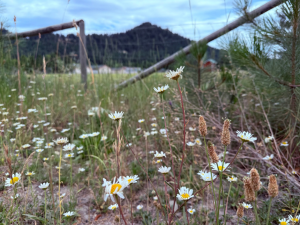 With Week 2 of our summer program nearing an end, it’s safe to say that I’ve had ample time to settle in here at the Grünewald Guild. I’ve absolutely loved the opportunity to work here in the beautiful Cascade Mountains for the summer and be a part of this inspiring community. I have the privilege of meeting new people every week, and the connections I’ve made here at the Guild are so valuable to me. I’ve learned a lot from our guests as well as my fellow staff members and supervisors.
With Week 2 of our summer program nearing an end, it’s safe to say that I’ve had ample time to settle in here at the Grünewald Guild. I’ve absolutely loved the opportunity to work here in the beautiful Cascade Mountains for the summer and be a part of this inspiring community. I have the privilege of meeting new people every week, and the connections I’ve made here at the Guild are so valuable to me. I’ve learned a lot from our guests as well as my fellow staff members and supervisors.